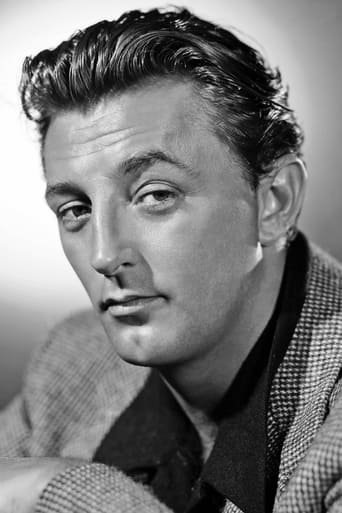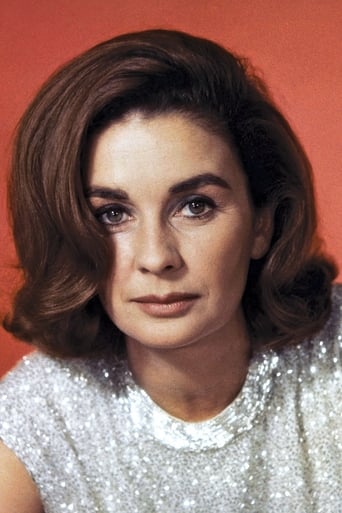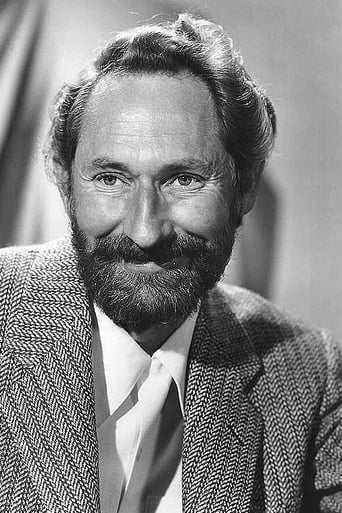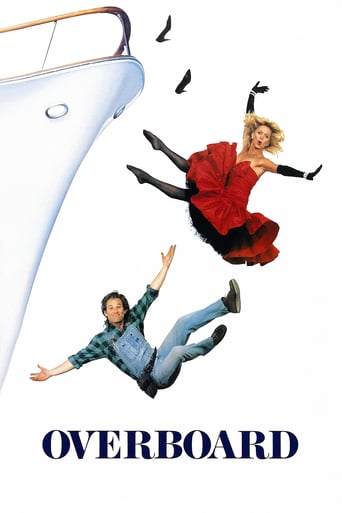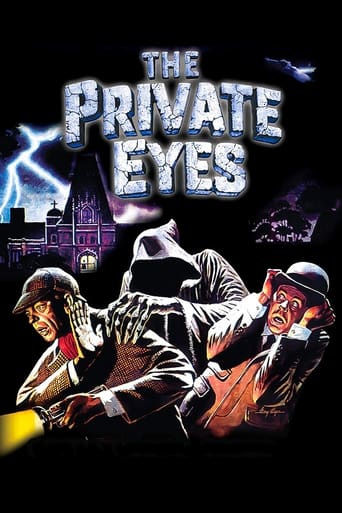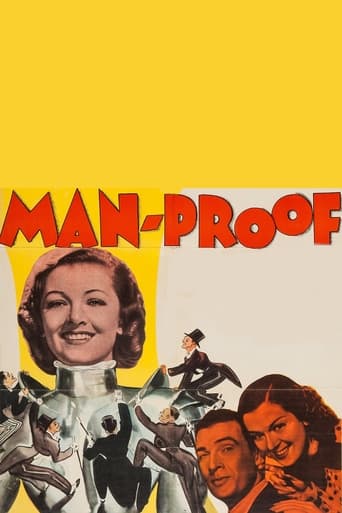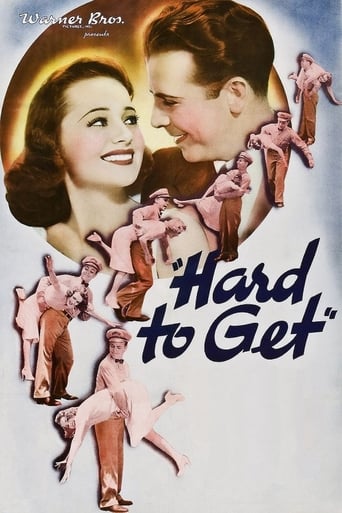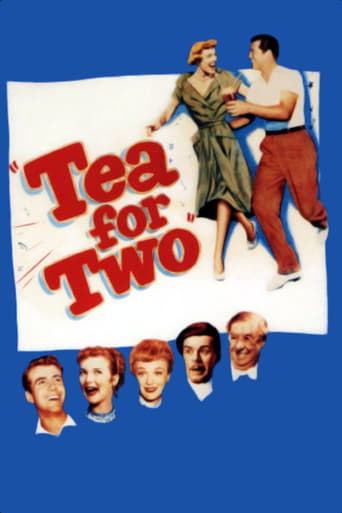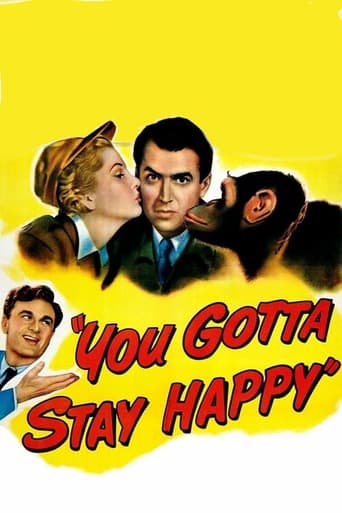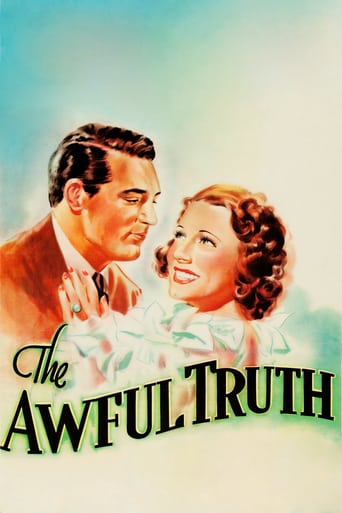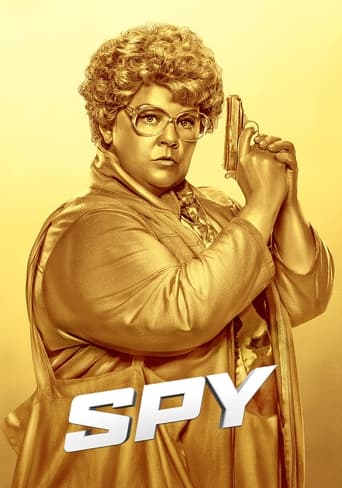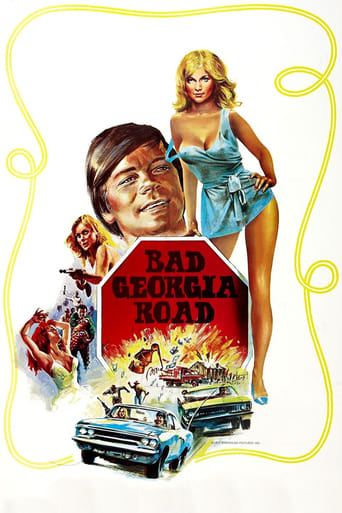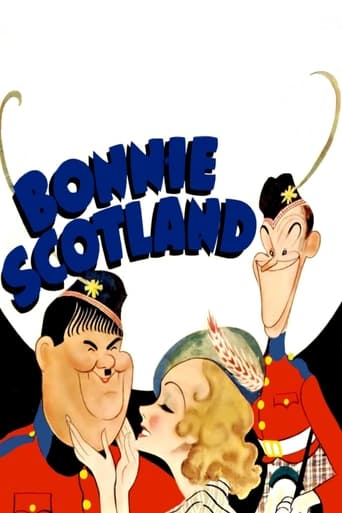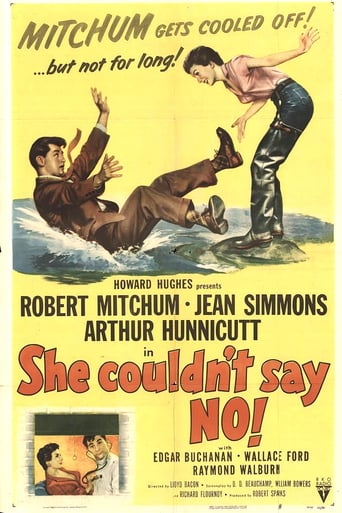
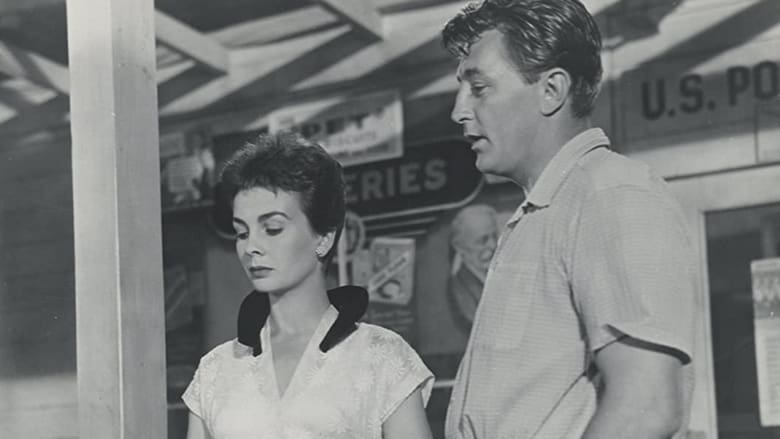
She Couldn't Say No (1954)
An heiress decides to pass out anonymous gifts in a small town.
Watch Trailer
Cast


Similar titles
Reviews
Strong and Moving!
Fun premise, good actors, bad writing. This film seemed to have potential at the beginning but it quickly devolves into a trite action film. Ultimately it's very boring.
Through painfully honest and emotional moments, the movie becomes irresistibly relatable
A clunky actioner with a handful of cool moments.
SHE COULDN'T SAY NO is a fascinating entry in the canon of Robert Mitchum films; it is comedy set in a small Arkansas town in which he plays a doctor with a passion for fishing. Life proceeds in a calm unhurried manner until spoiled rich girl Korby Lane (Jean Simmons) pays an extended visit. With more money than sense, she makes every effort to make the citizens' life better by giving them presents and/or gifts of cash, as she believes she has a debt to reply to the town, for having saved her life when she was a little girl. Unfortunately she only succeeds in creating chaos. Lloyd Bacon's film (his final work in a long career) has a strong moral tone to it, suggesting quite overtly that money is the root of all evil. D. D. Beauchamp's and William Powers' screenplay has some sharp one-liners in it, allowing Mitchum to display his talent for throwaway observations (something equally evident in the interviews he gave over the years on television). The film also has some strong character-performances by Arthur Hunnicutt (as Odie, a recovering alcoholic with a penchant for non sequiturs such as "It's very Monday today, isn't it"); Wallace Ford (as a splenetic vet); and Hope Landin (as a maternal boarding-house keeper). Simmons' costumes are a continual source of attention, especially when compared with the rather dowdy attire of the citizens; it's clear she is trying her best to draw people's gazes towards her. In terms of ideology. SHE COULDN'T SAY NO is redolent of mid-Fifties attitudes towards women, suggesting that they are not "fulfilled" unless they get married and have children. Hence the ending is rather wearily predictable. But nonetheless there are some incidental pleasures along the way, not least the sequence where Mitchum brings boxes of diapers to one of his patients' houses, only to find that Korby has (anonymously) sent a huge pile already. The sight of Mitchum's face, a mixture of anger and sheer bewilderment, is a sight to behold, reminding us - if we didn't already know - of his versatility as a film actor, despite his public protestations to the contrary.
This is one of those films which, for some reason or other, have become known by two quite different titles, in this case "She Couldn't Say No" and "Beautiful but Dangerous". To add to the confusion, it is not the only film to be known by either of those titles. There were three other films made between 1930 and 1940 entitled "She Couldn't Say No", the first of which (now believed lost) was made by the same director, Lloyd Bacon. Despite the coincidence, however, this film is not a remake of the 1930 one; indeed, it does not have any connection, as far as plot is concerned, with any of its namesakes. A Franco-Italian co-production from 1955, only a year after this film, is known as "Beautiful but Dangerous" in English, even though this is not an exact translation of either its French or Italian titles. The film is set in the (fictitious) small town of Progress, Arkansas, population 200. (In America it would seem that no settlement, however insignificant, is happy to be referred to as a village, except perhaps in New England where the term "village" is thought to confer the sort of olde-worlde rustic charm that is good for the tourist trade). Corby Lane, a wealthy heiress, visits the town in order to express her gratitude to its residents, who had paid for a critical medical operation for her when she was a child. (In the IMDb cast-list her Christian name is spelt "Korby", but this is clearly an error as a set of monogrammed luggage bearing the initials "CL" plays an important part in the plot). Corby decides to help the local people by giving them money anonymously, but things do not turn out as she had planned. A romance also develops between Corby and the local doctor, Robert Sellers.I watched the film because it features two major stars, Robert Mitchum and Jean Simmons, but neither is at their best here. Mitchum was generally better in serious dramas, notably films noirs and Westerns; in comedies he could be too laid-back, and here he just seems content to stroll through the film without taking anything seriously. Jean Simmons could be better as a comic actress, but here she appears to be trying too hard to impersonate Audrey Hepburn, who had made a huge impression in her Hollywood debut the previous year in "Roman Holiday". There was, granted, a certain physical resemblance between Simmons and Hepburn, but Simmons here tries to imitate not only Hepburn's hairstyle but also her characteristic gestures, mannerisms and even voice, and her performance (predictably) ends up looking and sounding forced and artificial. The main supporting actor is Arthur Hunnicutt who, as he normally did, plays a crusty old Deep South rustic with a thick accent virtually incomprehensible to anyone living on this side of the Atlantic. Indeed, it is probably equally incomprehensible to anyone from any part of America apart from Arkansas and the adjacent states. Hunnicutt played an almost identical character in "The French Line" (also directed by Bacon) the previous year; although he was only in his early forties at the time his characters seem much older. Corby is supposed to be American by birth, but the explanation is given that she was educated in Britain, thus accounting for Simmons' accent. Hunnicutt's character Odie, however, assumes that she is from Boston; the difference between British accents and certain East-coast American ones is not as clear-cut as we like to imagine. (I myself have been taken for a New Englander while travelling in one Western state). This was to be Bacon's last film - he died the following year- and I doubt if it is really the film he would have wished to be remembered by. It has been suggested on this board that it might have been better if it had been made by another director such as Frank Capra, but any director is only as good as his material, and the truth is that Bacon is here trying to make a silk purse out of a sow's ear. The basic idea could have been a good one, but it would have required a much funnier script; the one we actually have is leaden and humourless, with very few laughs to be had from beginning to end. When an inadequate script is combined with two below-par acting performances, the result is generally a predictably poor movie. 4/10 .
She Couldn't Say No terminated the tempestuous relationship of Jean Simmons with RKO Studios and her most eccentric boss Howard Hughes. It was shot in 1953 and released in 1954. Being that it was held up for a year also made it the farewell film for Robert Mitchum on his RKO contract. Soon Hughes would unload the studio itself and before the decade was over, RKO would be out of business.The film casts Jean Simmons as a rich heiress to an oil fortune who back when she passed through the town as a child she was the daughter of an oil wildcatter, ill and in need of an operation. The town raised the money for her and she's appreciative. Jean should have taken her lawyer's advice and just given the town a new school or library. But she goes to town incognito to determine the individual needs and wants of everybody. That gets her in trouble, but does provide a few chuckles, no real belly laughs.Simmons figures to make contact with the doctor who did the operation back then, but he's died and the practice has passed on to his son who is played by Robert Mitchum. He practices medicine as long as it doesn't interfere with his fishing with Jimmy Hunt.She Couldn't Say No is set in rural Arkansas and the biggest thing the film has going for it is the casting of such people as Raymond Walburn, Wallace Ford, Edgar Buchanan, Arthur Hunnicutt, Gus Schilling, etc. You see all those in the cast and you know the film is not going to be sophisticated comedy. They are as interesting a set of rustics you will ever find in any movie and they more than the disinterested stars make She Couldn't Say No entertaining.Mitchum and Simmons both thought lowly of this film and I'm inclined to agree.
This whimsical movie is set in a fictitious town in Arkansas called Progress. Places such as Little Rock and Pine Bluff are mentioned. Then in one part one of the locals talks about the location being a few miles northwest of Little Rock which would place it somewhere around Mayflower or Conway, Arkansas. The countryside depicted in the movie looks a whole lot like southern California. Possibly one reason the name Progress was chosen was not only to cater to the stereotype at the time of Arkansas as a backward hillbilly state but also because the "Natural State's" slogan in those days was "Land of Opportunity." Being a native Arkansawer (Arkansan), I was pleased to see a fellow Arkansan, Arthur Hunnicutt, and someone from Missouri, Edgar Buchanan, in the cast. Hunnicutt is buried in Greenwood, Arkansas, near Fort Smith. He was a wonderful character actor and added authenticity to the film. "She Couldn't Say No" teamed Jean Simmons and Robert Mitchum once more and the pairing works fairly well, not as good as Robert Mitchum and Jane Greer but better than some of the other female partners assigned him over the years. Both Simmons and Mitchum were top of the line Thespians and much under appreciated, even today. The title is weak and keeps many from watching a somewhat clever and entertaining flick.I agree with one of the IMDb reviewers that not enough time is spent by director Lloyd Bacon developing the theme of media sensationalism once the press gets word that an anonymous donor has given the 200 residents of Progress money (the exact amount is not revealed but it was obviously a large sum). There's an old W.C. Fields movie "If I Had A Million" and an early TV series "The Millionaire" that dealt with how a million dollars given to strangers would change their lives and rather than making their dreams come true would usually alter their dreams in negative ways. So there was much potential in the basic theme of "She Couldn't Say No" that was never realized. The idyllic sporting life lived by the country doctor is exploited in interesting ways, especially when trying to hook the big fish in the creek. It blends well with the romantic attachment between the country physician, Dr. Robert Sellers (Mitchum), and the high society lady with a British accent,Corby Lane (Simmons). The repartee between the two is at times humorous, especially in the beginning when Dr. Sellers thinks she's a crazy patient who may have escaped from a mental ward. Digger, a forerunner of Opie, adds a little depth to Dr. Sellers' character and tends to be an asset. All in all this Howard Hughes throwaway is a good one to catch.


